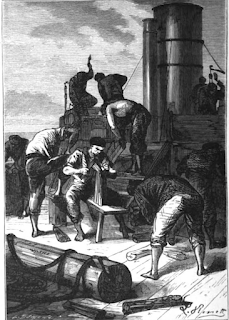Race against Time
The race against time. Perhaps one of the most popular and universal story motifs. Can Phileas Fogg get back to London before the eighty day deadline is up? Can Frodo destroy the Ring before Sauron works out what the West is up to? The tension grows, the reader’s heart beats faster. Very often it is elaborated by extra delays: the ship runs out of coal so they feed its woodwork to the boilers; the orcs capture Frodo and Sam is locked out.
We see this also in the real world: we are indeed living in a race against time. Can the whole world agree to limit carbon emissions before climate catastrophe destroys civilized life? Can we save the world from covid in time to get back to tackling the climate crisis? Can the agents of freedom prevent a takeover by reactionary forces who value neither world health nor the environment? It’s an exciting time to be alive, if you can stay alive.
For me, as a a writer, it’s not quite as dramatic. What I’ve found, and you may have had a similar experience, is that I’ve started on one project, only to have another jump on to the bandwagon, and in the midst of that a third. Some years ago, I was pottering along with an essay about language in early England. Not exactly a best seller, but an attempt to work out an argument for a view I’ve held for a long time that runs counter to the accepted picture.
But in the midst of this I felt a strong urge to do something about a very large collection of family papers. Again, not necessarily a project with wide appeal, but based on a feeling of responsibility towards a mass of interesting material that should not just go into an archive and be forgotten. This project involves a mountain of transcribing.
And again, in the middle of this, I received an unexpected prompting: to write something about the Gospels, using only my skills with text, my reading-level Greek, and my common sense; something that presents them in a new light. I’m in the middle of that. There’s no guarantee that any of it will get published, but there’s this sense of necessity being laid upon you.
What keeps me at it? Curiosity about things that don’t fit the accepted picture. A desire to establish a new case from the evidence. A pleasure in presenting something in a way that it hasn’t been seen before. Gently challenging accepted thinking seems to me to be a vital role of the Christian writer. He or she must follow in the path of the supreme storyteller, Jesus, whose parables constantly turned thinking upside down and back to front.
A writer sees the everyday from a different viewpoint. Think of Chesterton’s ‘Mooreeffoc’ effect (if you don’t know about it, look it up on Wikipedia). It is very difficult for a conformist to be an effective writer; not that you have to be a complete rebel or destroyer, but you need to question things. Questioning things that are good and true will never destroy them, but how else can you find out which they are?
So where does the race against time come in? Well, I’m 71 this year, still working four days a week, keeping three blogs going more or less, and with a family to consider, including two small grandsons. In a livestreamed service that I attended today I was greatly comforted by the reminder that Abraham didn’t even start his career until he was 75. Let that be a real encouragement to any would-be writer who’s only half that age but struggling with a job and a family!
In another livestreamed service, yesterday, the preacher mentioned, almost as an aside: ‘preparing to meet the Lord face to face, which is what the Christian life is all about’. In the end, we’re not trying to beat a deadline, to get all the writing written before the hour strikes. Rather, the writing is simply one part of the overall work of preparing to meet the Lord face to face; whatever is a necessary part of that preparation will find its place.


Great blog as usual. 'A writer sees the everyday from a different viewpoint.' That can be an uncomfortable position. The challenge is to find ways of writing that make people think – work it out for themselves `– as Jesus did with parables. The difficulty is not to get cancelled in the process!
ReplyDeleteEileen, I so agree - people can be very afraid of new angles on things, and so wish to get rid of them rather than consider them quietly!
DeleteI always look forward to your posts.
ReplyDeleteI refuse to believe you are 71. You must have a portrait in the attic...
ReplyDeleteThank you all for the kind comments! Two months before I turn 71, so still time to go grey!
ReplyDeleteHow did I not know about the mooreeffocc effect?? Fascinating stuff!
ReplyDelete